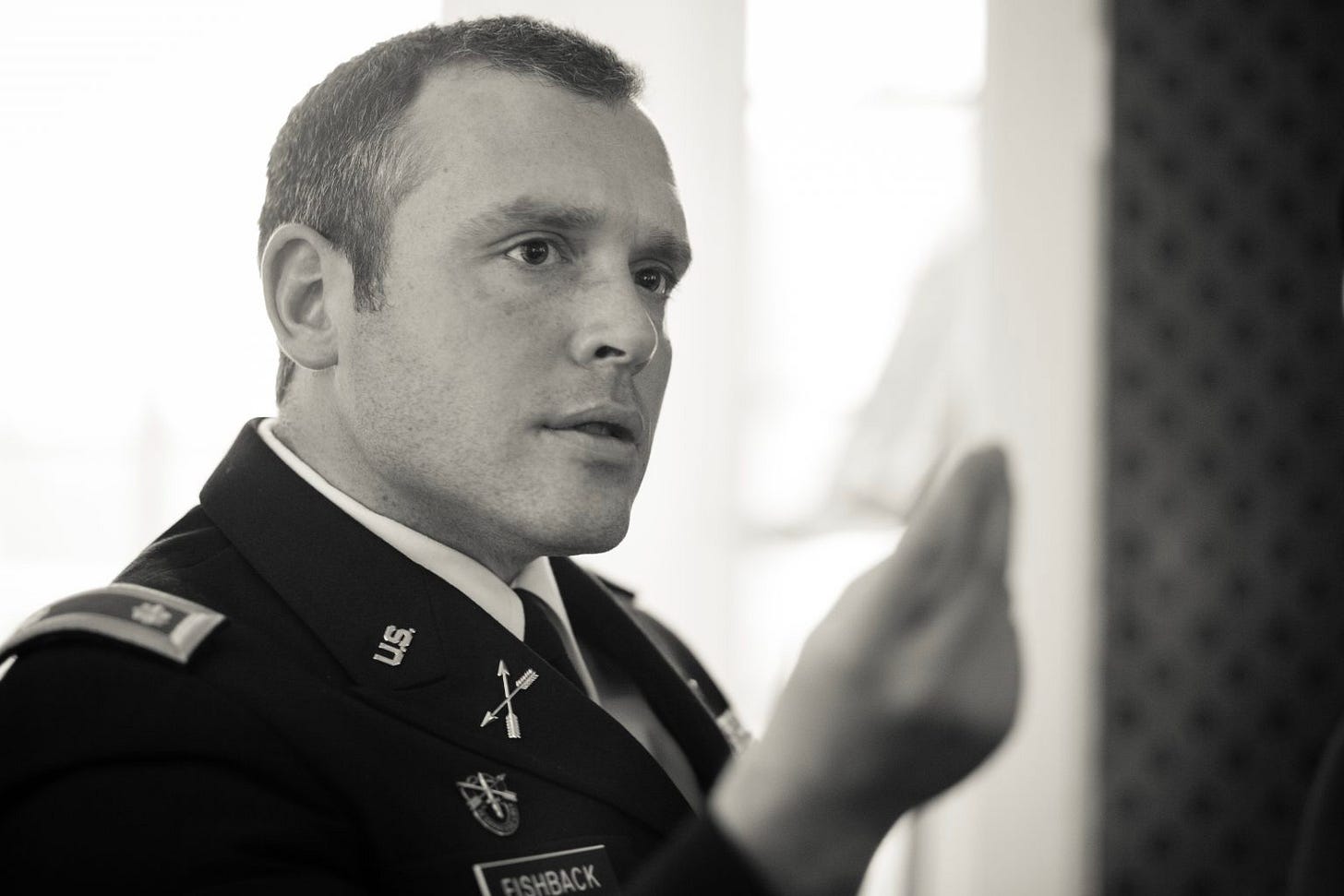Army Author: Ian Fishback
Image taken from the University of Pennsylvania’s Center for Ethics and the Rule of Law
Note that the Harding Project will regularly run profiles of distinguished military authors. As Major (ret.) Ian Fishback is laid to rest today, the Harding Project is honored to call him our first profile.
On Tuesday, U.S. Army Major (ret.) Ian Fishback’s family laid him to rest under blue skies at Arlington National Cemetery. Full military honors accompanied his funeral. Those honors befit the officer, who had before them honored his country by fearlessly stewarding its army. He did so through his example, through his instruction of cadets, and through his writing. He leaves behind a written record of courage that commands the attention of any soldier who aspires to take up the pen.
Major Fishback first stewarded the army by example while still only a company grade officer. While serving on a combat deployment with the 82nd Airborne Division, he witnessed American service members mistreat detainees. After attempting for seventeen months to clarify standards of detainee treatment through his chain of command, a young Captain Fishback wrote a whistleblowing letter to Senator John McCain, published shortly thereafter in the Washington Post under the headline “A Matter of Honor.” It bears quoting in long form:
Despite my efforts, I have been unable to get clear, consistent answers from my leadership about what constitutes lawful and humane treatment of detainees. I am certain that this confusion contributed to a wide range of abuses including death threats, beatings, broken bones, murder, exposure to elements, extreme forced physical exertion, hostage-taking, stripping, sleep deprivation and degrading treatment. I and troops under my command witnessed some of these abuses in both Afghanistan and Iraq.
This is a tragedy. I can remember, as a cadet at West Point, resolving to ensure that my men would never commit a dishonorable act; that I would protect them from that type of burden. It absolutely breaks my heart that I have failed some of them in this regard…
…Overcoming the fear posed by terrorist threats is a tremendous test of our courage. Will we confront danger and adversity in order to preserve our ideals, or will our courage and commitment to individual rights wither at the prospect of sacrifice? My response is simple. If we abandon our ideals in the face of adversity and aggression, then those ideals were never really in our possession. I would rather die fighting than give up even the smallest part of the idea that is "America."
Once again, I strongly urge you to do justice to your men and women in uniform. Give them clear standards of conduct that reflect the ideals they risk their lives for.
With the Utmost Respect,
-- Capt. Ian Fishback
1st Battalion,
504th Parachute Infantry Regiment,
82nd Airborne Division,
Fort Bragg, North Carolina
Fishback’s letter and subsequent efforts culminated in the Detainee Treatment Act of 2005.
After more deployments as a Green Beret, Fishback turned his full attention to the philosophical study of war. He earned a masters from the University of Michigan and became a rotating military faculty member at West Point’s Department of English and Philosophy. He himself commissioned from West Point in 2001, at the outset of the War on Terror. As an instructor, he taught a generation of officers who came of age in the War on Terror’s twilight the hard ethical lessons the army had learned in the interim.
In addition to teaching the academy’s mandatory ethics course, Fishback introduced the academy’s first ever class on Just War Theory with the aid of Dr. Richard Schoonhoven. To launch a course as a rotating military faculty member is a rare thing, and that he did so testifies to his near-unmatched commitment to his task. More notably, the course has since become a permanent one in the Department of English and Philosophy, and through it Major Fishback will continue to better the officer corps, long after his passing.
Fishback finally and perhaps most forcefully stewarded the army through a long career of writing. He left the army and earned a Ph.D. in philosophy from the University of Michigan. His academic works, deeply influenced by his military experiences, delved into the moral and legal intricacies of war and self-defense. From exploring the distinctions between "jus ad bellum" and "jus in bello" to principles of common defense and the role of necessity in warfare, Fishback's writings offered a nuanced understanding of the soldier’s moral position in war.
Ian Fishback passed away in November, 2021 from cardiac arrest while at an adult foster care home. His passing concluded a long struggle with mental health. It by many accounts resulted from a dysfunctional veteran care system which failed to act on repeatedly filed concerns of his friends and family that his prescribed medication regimen was harming rather than helping him. The circumstances of his death prompted a Veterans Affairs investigation and renewed calls from across the veteran and academic community for reform.
As the army and those who knew him bid farewell to Ian Fishback, the Harding Project reflects on the lessons Ian Fishback’s life offers to military authors. His ability to translate personal experiences into academic work demonstrates the importance of introspection and critical thinking. The commitment with which he instructed cadets is a reminder both of mentorship’s compounding power and the imperative to own one’s profession. His courage in speaking out against injustices, even at great personal risk, serves as a reminder of the power of the written word and the responsibility that comes with it.


